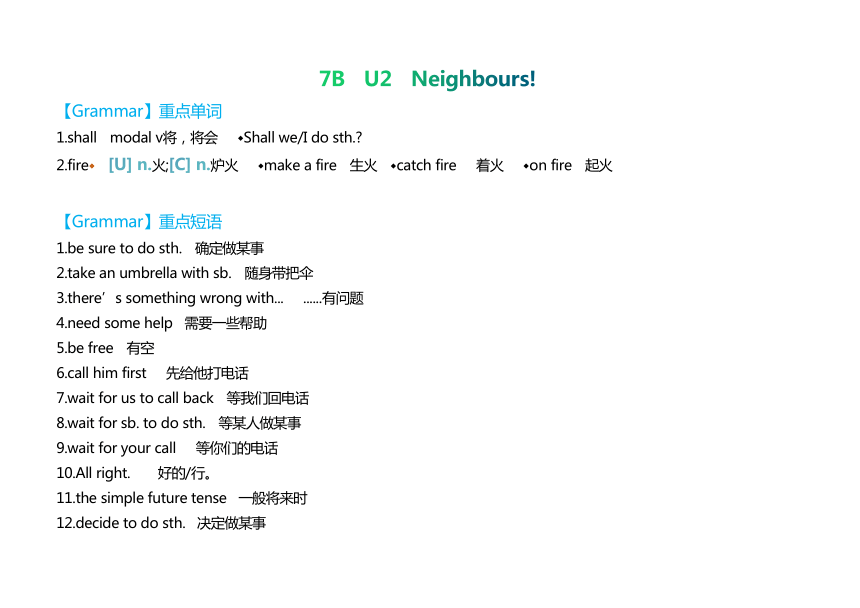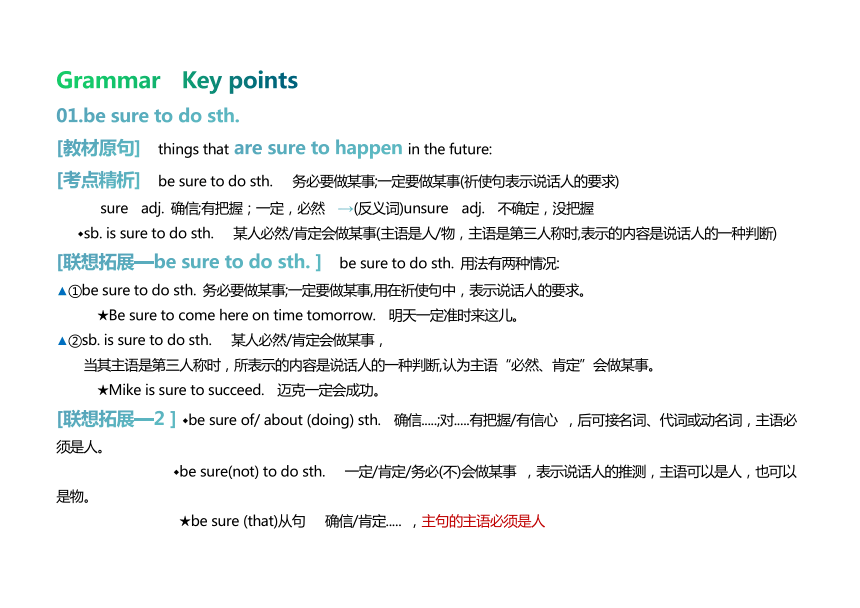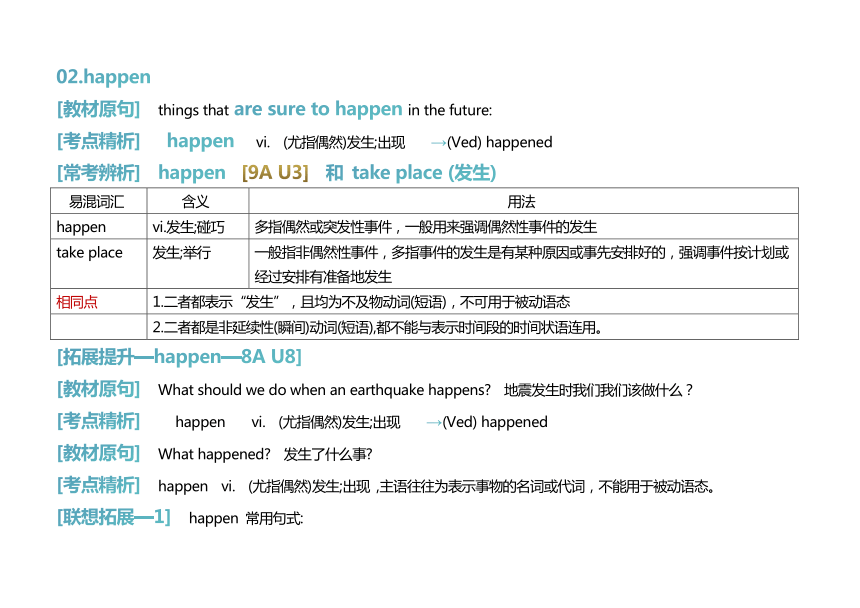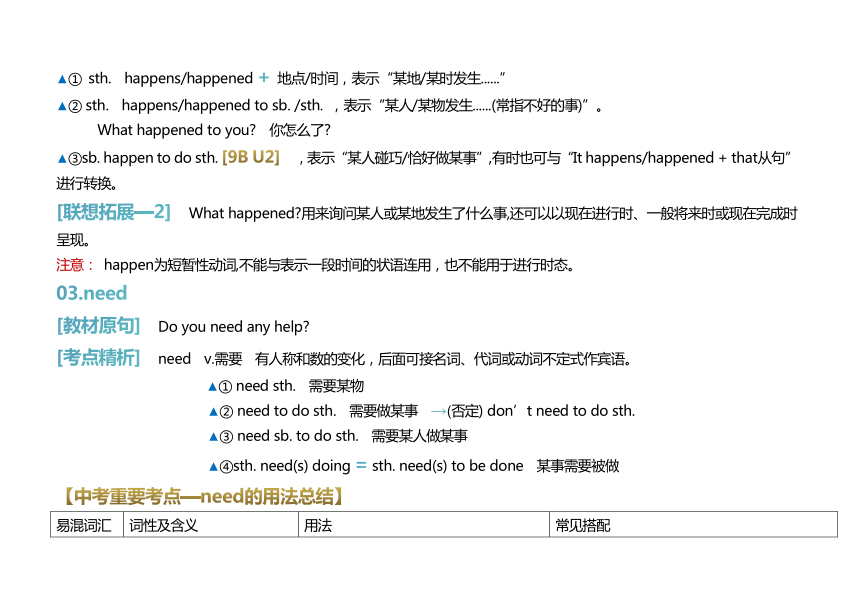Unit 2 Neighbours—Grammar 重点知识点讲义
文档属性
| 名称 | Unit 2 Neighbours—Grammar 重点知识点讲义 |  | |
| 格式 | docx | ||
| 文件大小 | 219.8KB | ||
| 资源类型 | 教案 | ||
| 版本资源 | 牛津译林版 | ||
| 科目 | 英语 | ||
| 更新时间 | 2024-01-25 16:31:48 | ||
图片预览





文档简介
7B U2 Neighbours!
【Grammar】重点单词
1.shall modal v将,将会 ◆Shall we/I do sth.
2.fire◆ [U] n.火;[C] n.炉火 ◆make a fire 生火 ◆catch fire 着火 ◆on fire 起火
【Grammar】重点短语
1.be sure to do sth. 确定做某事
2.take an umbrella with sb. 随身带把伞
3.there’s something wrong with... ......有问题
4.need some help 需要一些帮助
5.be free 有空
6.call him first 先给他打电话
7.wait for us to call back 等我们回电话
8.wait for sb. to do sth. 等某人做某事
9.wait for your call 等你们的电话
10.All right. 好的/行。
11.the simple future tense 一般将来时
12.decide to do sth. 决定做某事
13.plan a day out 计划外出一天/计划外出游玩一天
14.the day after tomorrow 后天
15.bring some water 带一些水
16.how/what about (about) doing sth. 做某事怎么样......
17.make a fire 生火
18.cook some food 做饭/ 烹饪食物
【Grammar】重点句子&语法
1.It will rain this afternoon. 今天下午将要下雨。
2.I will take an umbrella with me. 我将随身带把伞。
3.—Shall we go 我们将会去吗 —Yes,we will./—No,we will not. 是的,我们将会去。/不,我们将不会去。
4.Will you wait for us to call back 你会等我们回电话吗
5.It is so cloudy.I think it is going to rain. 天这么阴沉。我认为将会下雨。
6.My parents and I are planning a day out with my uncle's family the day after tomorrow.
我和我的父母正计划后天和我叔叔一家外出一天。
7.They are going to bring some water. 他们将会带一些水。
8.He is going to make a fire. 他打算生火。
Grammar Key points
01.be sure to do sth.
[教材原句] things that are sure to happen in the future:
[考点精析] be sure to do sth. 务必要做某事;一定要做某事(祈使句表示说话人的要求)
sure adj. 确信;有把握;一定,必然 →(反义词)unsure adj. 不确定,没把握
◆sb. is sure to do sth. 某人必然/肯定会做某事(主语是人/物,主语是第三人称时,表示的内容是说话人的一种判断)
[联想拓展—be sure to do sth. ] be sure to do sth. 用法有两种情况:
▲①be sure to do sth. 务必要做某事;一定要做某事,用在祈使句中,表示说话人的要求。
★Be sure to come here on time tomorrow. 明天一定准时来这儿。
▲②sb. is sure to do sth. 某人必然/肯定会做某事,
当其主语是第三人称时,所表示的内容是说话人的一种判断,认为主语“必然、肯定”会做某事。
★Mike is sure to succeed. 迈克一定会成功。
[联想拓展—2 ] ◆be sure of/ about (doing) sth. 确信.....;对.....有把握/有信心 ,后可接名词、代词或动名词,主语必须是人。
◆be sure(not) to do sth. 一定/肯定/务必(不)会做某事 ,表示说话人的推测,主语可以是人,也可以是物。
★be sure (that)从句 确信/肯定..... ,主句的主语必须是人
02.happen
[教材原句] things that are sure to happen in the future:
[考点精析] happen vi. (尤指偶然)发生;出现 →(Ved) happened
[常考辨析] happen [9A U3] 和 take place (发生)
易混词汇 含义 用法
happen vi.发生;碰巧 多指偶然或突发性事件,一般用来强调偶然性事件的发生
take place 发生;举行 一般指非偶然性事件,多指事件的发生是有某种原因或事先安排好的,强调事件按计划或经过安排有准备地发生
相同点 1.二者都表示“发生”,且均为不及物动词(短语),不可用于被动语态
2.二者都是非延续性(瞬间)动词(短语),都不能与表示时间段的时间状语连用。
[拓展提升—happen—8A U8]
[教材原句] What should we do when an earthquake happens 地震发生时我们我们该做什么?
[考点精析] happen vi. (尤指偶然)发生;出现 →(Ved) happened
[教材原句] What happened 发生了什么事
[考点精析] happen vi. (尤指偶然)发生;出现 ,主语往往为表示事物的名词或代词,不能用于被动语态。
[联想拓展—1] happen 常用句式:
▲① sth. happens/happened + 地点/时间,表示“某地/某时发生......”
▲② sth. happens/happened to sb. /sth. ,表示“某人/某物发生......(常指不好的事)”。
What happened to you 你怎么了
▲③sb. happen to do sth. [9B U2] ,表示“某人碰巧/恰好做某事”,有时也可与“It happens/happened + that从句”进行转换。
[联想拓展—2] What happened 用来询问某人或某地发生了什么事,还可以以现在进行时、一般将来时或现在完成时呈现。
注意: happen为短暂性动词,不能与表示一段时间的状语连用,也不能用于进行时态。
03.need
[教材原句] Do you need any help
[考点精析] need v.需要 有人称和数的变化,后面可接名词、代词或动词不定式作宾语。
▲① need sth. 需要某物
▲② need to do sth. 需要做某事 →(否定) don’t need to do sth.
▲③ need sb. to do sth. 需要某人做某事
▲④sth. need(s) doing = sth. need(s) to be done 某事需要被做
【中考重要考点—need的用法总结】
易混词汇 词性及含义 用法 常见搭配
need vt.需要 有人称、数及时态的变化 ◆need+n. 需要某物
◆need (sb.) to do sth. 需要(某人)做某事
◆need doing =sth. need to be done 某事需要被做
modal. 需要 情态动词需要,无人称和数的变化,多用于否定句和疑问句中。 ◆need+Vdo sth. 需要做某事
◆needn’t do sth. 不需要做某事
n.(食物、钱等的)短缺,缺乏 ◆in (great) need of sth. (特别)需要某物
need [U] n. 需要,必要
needs n.必需品
[复习回顾—need—7A U7] need v. 需要 modal v. 需要,必须 n.需要;必需品(复数needs)
[教材原句] They need books most. 他们最需要书。
[联想拓展—1] need还可用作情态动词和名词,
▲① need [U] n. 意为“需要,必要”;复数needs意为“必需品”
▲② need作情态动词时,意为“需要,必须”,无时态和人称变化,其后接动词原形,
多用于否定句和疑问句中。
need do sth.需要做某事 →(否定) needn’t do sth.
[联想拓展—2] 以 must 开头的一般疑问句,
其肯定回答为“Yes, sb. must.", 否定回答为“No, sb. needn't."。
—Must I finish my homework today 我必须今天完成作业吗
—No, you needn’t./don’t have to. 不,你不必。
04.wait
[教材原句] Will you wait for us to call back 你将等我们回电话吗
[考点精析] wait for sb. to do sth. 等某人做某事
wait vt.&vi. 等,等待,等候
◆wait for 等待 ◆wait for a moment/minute/while 等一会儿 ◆wait at sp. 等在某地
◆can’t wait to do sth. 迫不及待做某事
[复习回顾—waiter]
[考点精析] waiter◆ n.(餐馆等的)服务员 →(对应词)waitress 女服务员 →wait vt.&vi. 等,等待,等候
waiter是由“动词wait+后缀-er”构成的名词,通常指男服务员
[联想拓展] actor 演员 →actress 女演员 host 主持人→hostess 女主持人
05. the day after tomorrow 后天
[考点精析] the day after tomorrow 后天 ,表将来,用于一般将来时。
[联想拓展] 按照时间顺序排列的时间状语:
the day before yesterday 前天 →yesterday昨天 →today今天 →tomorrow明天 →the day after tomorrow后天
06.decide to do sth.
[考点精析] decide to do sth. 决定做某事 decide v. 决定 →decision n. 决定
【中考重要考点—decide 的用法总结】
▲①decide to do sth. = make a decision to do sth. = make up one’s mind to do sth. 决定做某事
▲②decide not to do sth. 决定不做某事
▲③decide+特殊疑问词+to do
▲④make a decision 做决定
▲⑤decide+宾语从句
▲⑥decide on/upon (doing) sth. 决定(做)某事
07.rain
[教材原句] It is so cloudy.I think it is going to rain.
[考点精析] rain vi.下雨 [U] n. 雨;雨水
◆rain heavily/hard 雨下得大.
[联想拓展] 常见的与天气有关的词:
sun(太阳)→sunny(晴朗的) cloud(云)→cloudy(多云的) snow(雪)→snowy(多雪的)
rain(雨)→rainy(多雨的) wind(风)→windy(多风的) fog(雾)→foggy(多雾的,有雾的)
08.plan
[教材原句] My parents and I are planning a day out with my uncle's family the day after tomorrow.
我和我的父母正计划后天和我叔叔一家外出一天。
[考点精析] plan a day out 计划外出一天
[复习回顾—plan—7A U6] plan vt.打算,计划 →n. 计划;规划 →(Ving)n. planning →(Ved)v. planned
[教材原句] I plan to go swimming every week. 我计划每周去游泳。
[考点精析] plan vt.打算,计划 →n. 计划;规划 →(Ving现在分词形式)n. planning →(Ved)v. planned
plan的常用结构: ◆plan sth. 计划煤某事
◆plan to do sth. 计划做某事
[联想拓展] plan n. 计划,规划
名词plan的常用词组:◆make a plan 制定一个计划
◆make a plan/plans (for...) (为……)制订计划或方案
◆the plan for... ……的计划或方案
09.bring
[教材原句] There are going to bring some water. 他们将会带来一些水。
[考点精析] bring v.带来,拿来 →(Ved)brought
[中考常考辨析] carry [7A U7 ],bring,take和get
易混词 含义 用法
carry 拿;提;搬;搬运,携带,肩挑,手提 无方向
bring 带来,拿来 指把某物或人从别的地方带到说话者处,即动作由远及近,常与here连用。 常见搭配:◆bring…to… 把......带到......来 ◆bring…here 把......带到这儿来
take 带走,拿走 指把某物或某人从说话处带到别处,即动作由近及远,常与there连用。 常见搭配:◆take…to… 把......带到......去 ◆take..there 把......带到那儿去 ◆take away 拿走
get 取,拿;去取(或带来) 双方向,即去再回来。 常见搭配:◆get sb. sth. = get sth. for sb. 去为某get人取来某物
10. How about… = What about… .....怎么样 ……又如何呢?
[教材原句] How about your uncle 你叔叔呢
[考点精析] How about... 相当于What about... ....怎么样呢 常用于询问对方或第三者与情景有关的情况 ,后接名词、代词或动词-ing形式。
▲①How about doing sth. = What about doing sth.
▲②How/What about doing sth./pron. 宾格形式
[联想拓展] What/How about… 的常见用法如下:
▲①向对方提出建议或请求。
▲②征询对方的看法或意见。
▲③询问天气或身体等情况。
★What about the weather in your hometown 你们家乡的天气如何
★How about your father now 你父亲近来身体好吗
▲④寒暄时用作承接上下文的转折语。
★What about you 你呢
11.fire
[教材原句] He is going to make afire. 他将会生火。
[考点精析] fire◆ [U] n.火;[C] n.炉火,一般作不可数名词,但指火灾或一场大火时为可数名词。
→fireman n. 救火员,消防员 →(复数)firemen
◆make a fire 生火 ◆catch fire 着火 ◆on fire 起火
[联想拓展] fire的相关短语:
◆a fire 一场火灾
◆on the fire 在火炉上,在火上
◆at the fire 在火炉旁
◆ make a fire 生火
◆be on fire 着火 ◆on fire 着火 ◆catch fire 着火
◆put out the fire 灭火
◆play with fire 玩火
◆set fire to sth./set sth. on fire 点着某物
[常考辨析] catch fire 与 be on fire [8A U8 ]
易混词汇 含义及用法
catch fire [U] n. 意为“着火”,强调动作
be on fire 意为“着火”,强调状态
Grammar:Simple future tense 一般将来时精讲
01.一般将来时含义:
一般将来时表示将来发生的动作或存在的状态。
02.一般将来时的常用时间标志词/时间状语:
1.表将来的时间副词或短语。
▲tomorrow,tonight,soon,the day after tomorrow,next week/month/year/Friday…this afternoon/evening/weekend…,from now on,some day等。
2.“in+时间段”构成的短语。
▲in a week/month,in two months,in an hour等。 注意:对“in+时间段”提问用how soon,多久之后
3.“in+未来的时间”构成的短语。
▲in 2020,in the future等。
03.一般将来时的构成:
1.肯定句:
▲①主语+be(am/is/are)+going to+动词原形+其他.
▲②主语+will+动词原形+其他.
▲③主语(I/We)+shall+动词原形+其他.
▲④be doing 现在进行时也可以表示将来。
常用于这种结构的动词有:come,go,leave,move,fly,start,begin等短暂性动词,一般为位移动词。
2.否定句:分别在be,will,shall后面加not;will not和shall not可缩写为won't和shan't。
▲①主语+be(am/is/are)+not+going to+动词原形+其他.
▲②主语+will+not+动词原形+其他. = 主语+won’t+动词原形+其他.
▲③主语(I/We)+shall+not+动词原形+其他. = 主语(I/We)+shan’t+动词原形+其他.
▲④be+not+ doing 现在进行时也可以表示将来。
常用于这种结构的动词有:come,go,leave,move,fly,start,begin等短暂性动词,一般为位移动词。
3.一般疑问句:分别将be,will,shall提到句首。
▲①Be(Am/Is/Are)+主语+going to+动词原形+其他
▲②Will+主语+动词原形+其他
▲③Shall+主语(I/we)+动词原形+其他
▲④be doing 现在进行时也可以表示将来。
常用于这种结构的动词有:come,go,leave,move,fly,start,begin等短暂性动词,一般为位移动词。
4.特殊疑问句:特殊疑问词+一般疑问句+其他
▲①特殊疑问词+Be(Am/Is/Are)+主语+going to+动词原形+其他
▲②特殊疑问词+will+主语+动词原形+其他
▲③特殊疑问词+shall+主语(I/we)+动词原形+其他
04.一般将来时的注意事项:
▲①will除用于一般将来时中,还可表示意愿、邀请、要求等。
★I'll be glad to help you. 我很乐意帮助你。
★Will you do sth. with me 你愿意和我一起做某事吗
★Will you please not do sth. 请不要做某事好吗
▲②shall用于第一人称I或we作主语的一般疑问句,还可表示征求对方的意见或提出建议。
★Shall we/I do sth. 我们/我做某事好吗
▲③表示根据迹象判断将要发生某事,常用be going to。
★Look at those black clouds.It's going to rain. 看那些乌云。天将要下雨了。
05.will与be going to的区别:
1.be going to强调的是在说话时刻之前已经考虑过的,即强调计划性和安排性;
2.will强调的是客观情况。
[常考辨析] will与 be going to的区别
使用情况分析 be going to will
时间远近 表示近期、眼下就要发生的事情 will表示的将来时间则较远一些
主客观推断 表示根据主观判断将来肯定发生的事情 表示客观上将来势必发生的事情
计划,准备 be going to含有“计划,准备”的意思 而will没有这个意思
某种迹象推断 表示根据目前迹象推断将要发生的事情 而在没有迹象表明的情况下进行的猜测用will和be going to皆可
在有条件从句的主句中 一般不用be going to 多用will
▲④be going to表示根据目前迹象推断将要发生的事情,而在没有迹象表明的情况下进行的猜测用will和be going to皆可。★Look at the black clouds in the sky.It's going to rain. 看天上的乌云。快下雨了。
★I think the weather is going to be nice. 我想天气会转晴的。
▲⑤在有条件从句的主句中,一般不用be going to,而多用will。如:
★We'll have a big dinner if my mother is free. 如果我妈妈有空,我们会去吃大餐。
06.there be结构的一般将来时形式为:
there will be或there be(is/are)going to be
▲①There will be+名词+其他.
▲②There is/are going to be+名词+其他.”。
【Grammar】重点单词
1.shall modal v将,将会 ◆Shall we/I do sth.
2.fire◆ [U] n.火;[C] n.炉火 ◆make a fire 生火 ◆catch fire 着火 ◆on fire 起火
【Grammar】重点短语
1.be sure to do sth. 确定做某事
2.take an umbrella with sb. 随身带把伞
3.there’s something wrong with... ......有问题
4.need some help 需要一些帮助
5.be free 有空
6.call him first 先给他打电话
7.wait for us to call back 等我们回电话
8.wait for sb. to do sth. 等某人做某事
9.wait for your call 等你们的电话
10.All right. 好的/行。
11.the simple future tense 一般将来时
12.decide to do sth. 决定做某事
13.plan a day out 计划外出一天/计划外出游玩一天
14.the day after tomorrow 后天
15.bring some water 带一些水
16.how/what about (about) doing sth. 做某事怎么样......
17.make a fire 生火
18.cook some food 做饭/ 烹饪食物
【Grammar】重点句子&语法
1.It will rain this afternoon. 今天下午将要下雨。
2.I will take an umbrella with me. 我将随身带把伞。
3.—Shall we go 我们将会去吗 —Yes,we will./—No,we will not. 是的,我们将会去。/不,我们将不会去。
4.Will you wait for us to call back 你会等我们回电话吗
5.It is so cloudy.I think it is going to rain. 天这么阴沉。我认为将会下雨。
6.My parents and I are planning a day out with my uncle's family the day after tomorrow.
我和我的父母正计划后天和我叔叔一家外出一天。
7.They are going to bring some water. 他们将会带一些水。
8.He is going to make a fire. 他打算生火。
Grammar Key points
01.be sure to do sth.
[教材原句] things that are sure to happen in the future:
[考点精析] be sure to do sth. 务必要做某事;一定要做某事(祈使句表示说话人的要求)
sure adj. 确信;有把握;一定,必然 →(反义词)unsure adj. 不确定,没把握
◆sb. is sure to do sth. 某人必然/肯定会做某事(主语是人/物,主语是第三人称时,表示的内容是说话人的一种判断)
[联想拓展—be sure to do sth. ] be sure to do sth. 用法有两种情况:
▲①be sure to do sth. 务必要做某事;一定要做某事,用在祈使句中,表示说话人的要求。
★Be sure to come here on time tomorrow. 明天一定准时来这儿。
▲②sb. is sure to do sth. 某人必然/肯定会做某事,
当其主语是第三人称时,所表示的内容是说话人的一种判断,认为主语“必然、肯定”会做某事。
★Mike is sure to succeed. 迈克一定会成功。
[联想拓展—2 ] ◆be sure of/ about (doing) sth. 确信.....;对.....有把握/有信心 ,后可接名词、代词或动名词,主语必须是人。
◆be sure(not) to do sth. 一定/肯定/务必(不)会做某事 ,表示说话人的推测,主语可以是人,也可以是物。
★be sure (that)从句 确信/肯定..... ,主句的主语必须是人
02.happen
[教材原句] things that are sure to happen in the future:
[考点精析] happen vi. (尤指偶然)发生;出现 →(Ved) happened
[常考辨析] happen [9A U3] 和 take place (发生)
易混词汇 含义 用法
happen vi.发生;碰巧 多指偶然或突发性事件,一般用来强调偶然性事件的发生
take place 发生;举行 一般指非偶然性事件,多指事件的发生是有某种原因或事先安排好的,强调事件按计划或经过安排有准备地发生
相同点 1.二者都表示“发生”,且均为不及物动词(短语),不可用于被动语态
2.二者都是非延续性(瞬间)动词(短语),都不能与表示时间段的时间状语连用。
[拓展提升—happen—8A U8]
[教材原句] What should we do when an earthquake happens 地震发生时我们我们该做什么?
[考点精析] happen vi. (尤指偶然)发生;出现 →(Ved) happened
[教材原句] What happened 发生了什么事
[考点精析] happen vi. (尤指偶然)发生;出现 ,主语往往为表示事物的名词或代词,不能用于被动语态。
[联想拓展—1] happen 常用句式:
▲① sth. happens/happened + 地点/时间,表示“某地/某时发生......”
▲② sth. happens/happened to sb. /sth. ,表示“某人/某物发生......(常指不好的事)”。
What happened to you 你怎么了
▲③sb. happen to do sth. [9B U2] ,表示“某人碰巧/恰好做某事”,有时也可与“It happens/happened + that从句”进行转换。
[联想拓展—2] What happened 用来询问某人或某地发生了什么事,还可以以现在进行时、一般将来时或现在完成时呈现。
注意: happen为短暂性动词,不能与表示一段时间的状语连用,也不能用于进行时态。
03.need
[教材原句] Do you need any help
[考点精析] need v.需要 有人称和数的变化,后面可接名词、代词或动词不定式作宾语。
▲① need sth. 需要某物
▲② need to do sth. 需要做某事 →(否定) don’t need to do sth.
▲③ need sb. to do sth. 需要某人做某事
▲④sth. need(s) doing = sth. need(s) to be done 某事需要被做
【中考重要考点—need的用法总结】
易混词汇 词性及含义 用法 常见搭配
need vt.需要 有人称、数及时态的变化 ◆need+n. 需要某物
◆need (sb.) to do sth. 需要(某人)做某事
◆need doing =sth. need to be done 某事需要被做
modal. 需要 情态动词需要,无人称和数的变化,多用于否定句和疑问句中。 ◆need+Vdo sth. 需要做某事
◆needn’t do sth. 不需要做某事
n.(食物、钱等的)短缺,缺乏 ◆in (great) need of sth. (特别)需要某物
need [U] n. 需要,必要
needs n.必需品
[复习回顾—need—7A U7] need v. 需要 modal v. 需要,必须 n.需要;必需品(复数needs)
[教材原句] They need books most. 他们最需要书。
[联想拓展—1] need还可用作情态动词和名词,
▲① need [U] n. 意为“需要,必要”;复数needs意为“必需品”
▲② need作情态动词时,意为“需要,必须”,无时态和人称变化,其后接动词原形,
多用于否定句和疑问句中。
need do sth.需要做某事 →(否定) needn’t do sth.
[联想拓展—2] 以 must 开头的一般疑问句,
其肯定回答为“Yes, sb. must.", 否定回答为“No, sb. needn't."。
—Must I finish my homework today 我必须今天完成作业吗
—No, you needn’t./don’t have to. 不,你不必。
04.wait
[教材原句] Will you wait for us to call back 你将等我们回电话吗
[考点精析] wait for sb. to do sth. 等某人做某事
wait vt.&vi. 等,等待,等候
◆wait for 等待 ◆wait for a moment/minute/while 等一会儿 ◆wait at sp. 等在某地
◆can’t wait to do sth. 迫不及待做某事
[复习回顾—waiter]
[考点精析] waiter◆ n.(餐馆等的)服务员 →(对应词)waitress 女服务员 →wait vt.&vi. 等,等待,等候
waiter是由“动词wait+后缀-er”构成的名词,通常指男服务员
[联想拓展] actor 演员 →actress 女演员 host 主持人→hostess 女主持人
05. the day after tomorrow 后天
[考点精析] the day after tomorrow 后天 ,表将来,用于一般将来时。
[联想拓展] 按照时间顺序排列的时间状语:
the day before yesterday 前天 →yesterday昨天 →today今天 →tomorrow明天 →the day after tomorrow后天
06.decide to do sth.
[考点精析] decide to do sth. 决定做某事 decide v. 决定 →decision n. 决定
【中考重要考点—decide 的用法总结】
▲①decide to do sth. = make a decision to do sth. = make up one’s mind to do sth. 决定做某事
▲②decide not to do sth. 决定不做某事
▲③decide+特殊疑问词+to do
▲④make a decision 做决定
▲⑤decide+宾语从句
▲⑥decide on/upon (doing) sth. 决定(做)某事
07.rain
[教材原句] It is so cloudy.I think it is going to rain.
[考点精析] rain vi.下雨 [U] n. 雨;雨水
◆rain heavily/hard 雨下得大.
[联想拓展] 常见的与天气有关的词:
sun(太阳)→sunny(晴朗的) cloud(云)→cloudy(多云的) snow(雪)→snowy(多雪的)
rain(雨)→rainy(多雨的) wind(风)→windy(多风的) fog(雾)→foggy(多雾的,有雾的)
08.plan
[教材原句] My parents and I are planning a day out with my uncle's family the day after tomorrow.
我和我的父母正计划后天和我叔叔一家外出一天。
[考点精析] plan a day out 计划外出一天
[复习回顾—plan—7A U6] plan vt.打算,计划 →n. 计划;规划 →(Ving)n. planning →(Ved)v. planned
[教材原句] I plan to go swimming every week. 我计划每周去游泳。
[考点精析] plan vt.打算,计划 →n. 计划;规划 →(Ving现在分词形式)n. planning →(Ved)v. planned
plan的常用结构: ◆plan sth. 计划煤某事
◆plan to do sth. 计划做某事
[联想拓展] plan n. 计划,规划
名词plan的常用词组:◆make a plan 制定一个计划
◆make a plan/plans (for...) (为……)制订计划或方案
◆the plan for... ……的计划或方案
09.bring
[教材原句] There are going to bring some water. 他们将会带来一些水。
[考点精析] bring v.带来,拿来 →(Ved)brought
[中考常考辨析] carry [7A U7 ],bring,take和get
易混词 含义 用法
carry 拿;提;搬;搬运,携带,肩挑,手提 无方向
bring 带来,拿来 指把某物或人从别的地方带到说话者处,即动作由远及近,常与here连用。 常见搭配:◆bring…to… 把......带到......来 ◆bring…here 把......带到这儿来
take 带走,拿走 指把某物或某人从说话处带到别处,即动作由近及远,常与there连用。 常见搭配:◆take…to… 把......带到......去 ◆take..there 把......带到那儿去 ◆take away 拿走
get 取,拿;去取(或带来) 双方向,即去再回来。 常见搭配:◆get sb. sth. = get sth. for sb. 去为某get人取来某物
10. How about… = What about… .....怎么样 ……又如何呢?
[教材原句] How about your uncle 你叔叔呢
[考点精析] How about... 相当于What about... ....怎么样呢 常用于询问对方或第三者与情景有关的情况 ,后接名词、代词或动词-ing形式。
▲①How about doing sth. = What about doing sth.
▲②How/What about doing sth./pron. 宾格形式
[联想拓展] What/How about… 的常见用法如下:
▲①向对方提出建议或请求。
▲②征询对方的看法或意见。
▲③询问天气或身体等情况。
★What about the weather in your hometown 你们家乡的天气如何
★How about your father now 你父亲近来身体好吗
▲④寒暄时用作承接上下文的转折语。
★What about you 你呢
11.fire
[教材原句] He is going to make afire. 他将会生火。
[考点精析] fire◆ [U] n.火;[C] n.炉火,一般作不可数名词,但指火灾或一场大火时为可数名词。
→fireman n. 救火员,消防员 →(复数)firemen
◆make a fire 生火 ◆catch fire 着火 ◆on fire 起火
[联想拓展] fire的相关短语:
◆a fire 一场火灾
◆on the fire 在火炉上,在火上
◆at the fire 在火炉旁
◆ make a fire 生火
◆be on fire 着火 ◆on fire 着火 ◆catch fire 着火
◆put out the fire 灭火
◆play with fire 玩火
◆set fire to sth./set sth. on fire 点着某物
[常考辨析] catch fire 与 be on fire [8A U8 ]
易混词汇 含义及用法
catch fire [U] n. 意为“着火”,强调动作
be on fire 意为“着火”,强调状态
Grammar:Simple future tense 一般将来时精讲
01.一般将来时含义:
一般将来时表示将来发生的动作或存在的状态。
02.一般将来时的常用时间标志词/时间状语:
1.表将来的时间副词或短语。
▲tomorrow,tonight,soon,the day after tomorrow,next week/month/year/Friday…this afternoon/evening/weekend…,from now on,some day等。
2.“in+时间段”构成的短语。
▲in a week/month,in two months,in an hour等。 注意:对“in+时间段”提问用how soon,多久之后
3.“in+未来的时间”构成的短语。
▲in 2020,in the future等。
03.一般将来时的构成:
1.肯定句:
▲①主语+be(am/is/are)+going to+动词原形+其他.
▲②主语+will+动词原形+其他.
▲③主语(I/We)+shall+动词原形+其他.
▲④be doing 现在进行时也可以表示将来。
常用于这种结构的动词有:come,go,leave,move,fly,start,begin等短暂性动词,一般为位移动词。
2.否定句:分别在be,will,shall后面加not;will not和shall not可缩写为won't和shan't。
▲①主语+be(am/is/are)+not+going to+动词原形+其他.
▲②主语+will+not+动词原形+其他. = 主语+won’t+动词原形+其他.
▲③主语(I/We)+shall+not+动词原形+其他. = 主语(I/We)+shan’t+动词原形+其他.
▲④be+not+ doing 现在进行时也可以表示将来。
常用于这种结构的动词有:come,go,leave,move,fly,start,begin等短暂性动词,一般为位移动词。
3.一般疑问句:分别将be,will,shall提到句首。
▲①Be(Am/Is/Are)+主语+going to+动词原形+其他
▲②Will+主语+动词原形+其他
▲③Shall+主语(I/we)+动词原形+其他
▲④be doing 现在进行时也可以表示将来。
常用于这种结构的动词有:come,go,leave,move,fly,start,begin等短暂性动词,一般为位移动词。
4.特殊疑问句:特殊疑问词+一般疑问句+其他
▲①特殊疑问词+Be(Am/Is/Are)+主语+going to+动词原形+其他
▲②特殊疑问词+will+主语+动词原形+其他
▲③特殊疑问词+shall+主语(I/we)+动词原形+其他
04.一般将来时的注意事项:
▲①will除用于一般将来时中,还可表示意愿、邀请、要求等。
★I'll be glad to help you. 我很乐意帮助你。
★Will you do sth. with me 你愿意和我一起做某事吗
★Will you please not do sth. 请不要做某事好吗
▲②shall用于第一人称I或we作主语的一般疑问句,还可表示征求对方的意见或提出建议。
★Shall we/I do sth. 我们/我做某事好吗
▲③表示根据迹象判断将要发生某事,常用be going to。
★Look at those black clouds.It's going to rain. 看那些乌云。天将要下雨了。
05.will与be going to的区别:
1.be going to强调的是在说话时刻之前已经考虑过的,即强调计划性和安排性;
2.will强调的是客观情况。
[常考辨析] will与 be going to的区别
使用情况分析 be going to will
时间远近 表示近期、眼下就要发生的事情 will表示的将来时间则较远一些
主客观推断 表示根据主观判断将来肯定发生的事情 表示客观上将来势必发生的事情
计划,准备 be going to含有“计划,准备”的意思 而will没有这个意思
某种迹象推断 表示根据目前迹象推断将要发生的事情 而在没有迹象表明的情况下进行的猜测用will和be going to皆可
在有条件从句的主句中 一般不用be going to 多用will
▲④be going to表示根据目前迹象推断将要发生的事情,而在没有迹象表明的情况下进行的猜测用will和be going to皆可。★Look at the black clouds in the sky.It's going to rain. 看天上的乌云。快下雨了。
★I think the weather is going to be nice. 我想天气会转晴的。
▲⑤在有条件从句的主句中,一般不用be going to,而多用will。如:
★We'll have a big dinner if my mother is free. 如果我妈妈有空,我们会去吃大餐。
06.there be结构的一般将来时形式为:
there will be或there be(is/are)going to be
▲①There will be+名词+其他.
▲②There is/are going to be+名词+其他.”。
